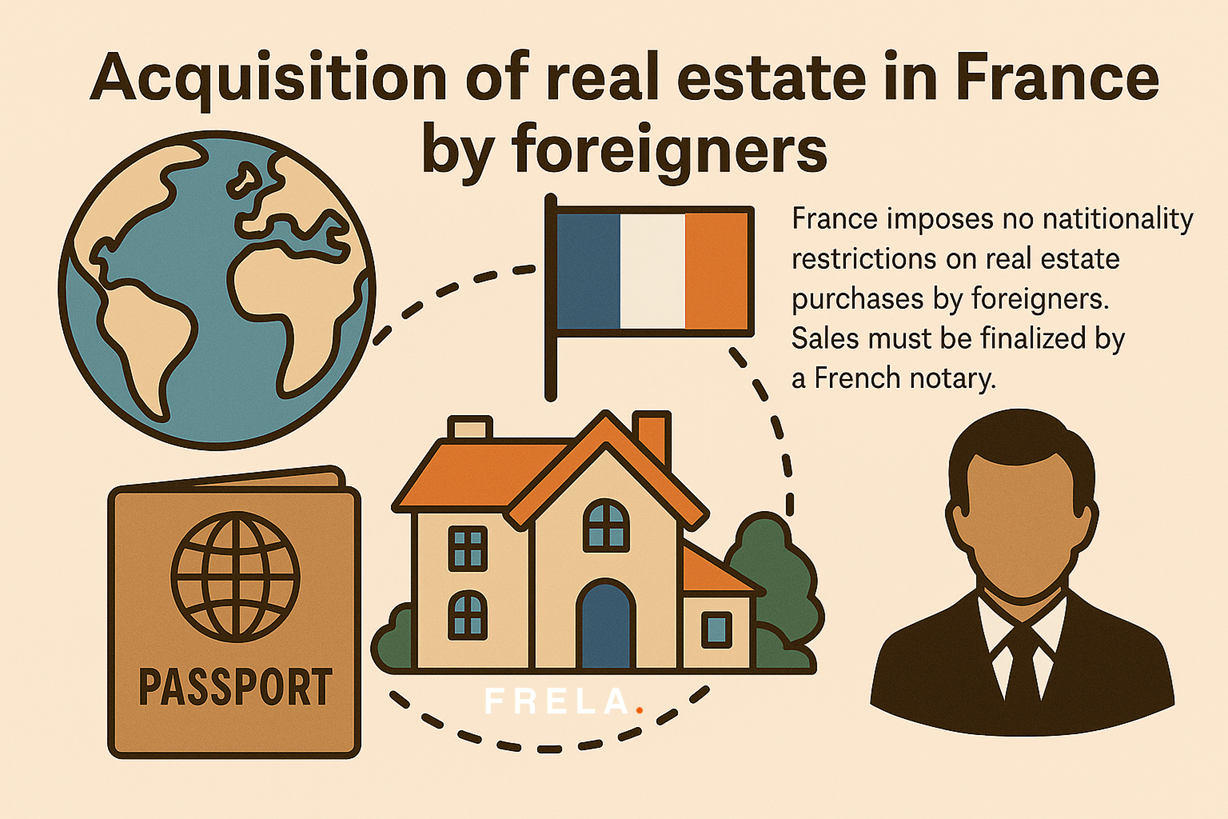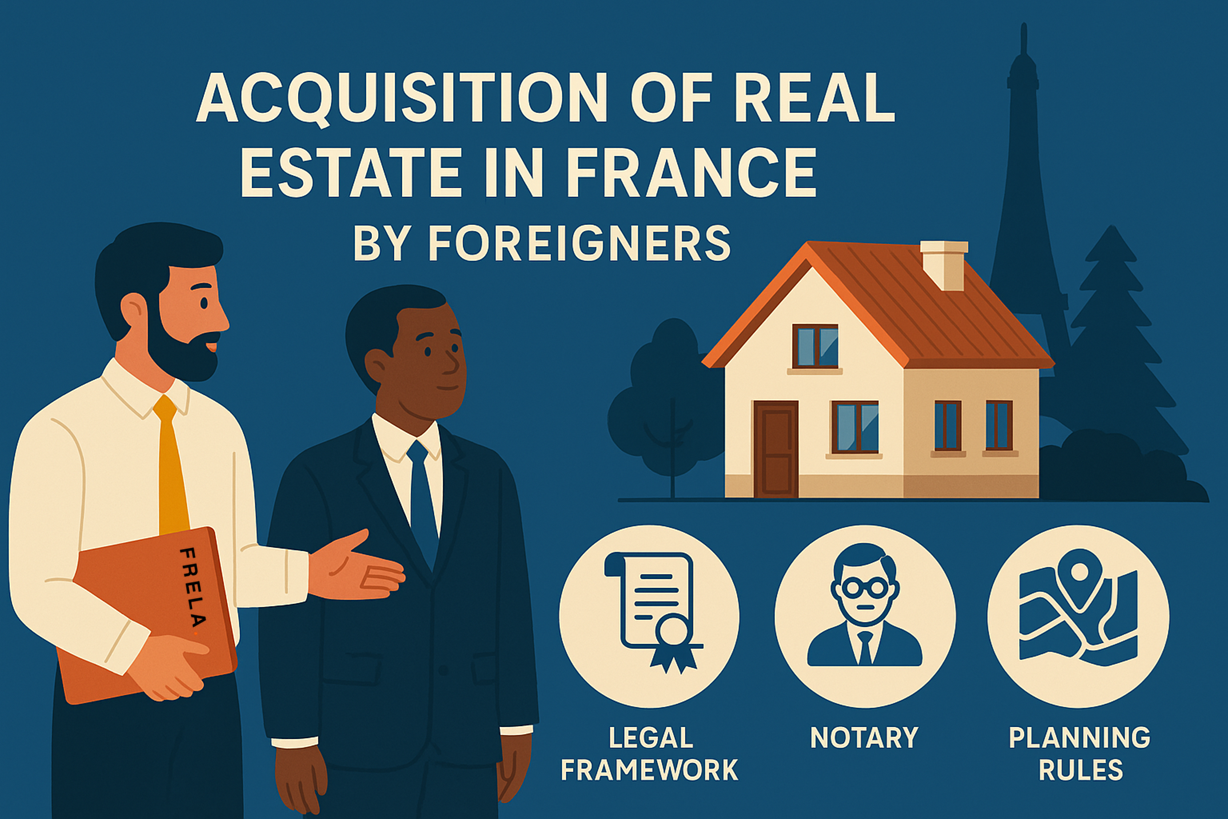Acquisition of real estate in France by foreigners: legal framework, urban planning
The purchase of a property in France by a foreign investor is an attractive operation, but one that requires a detailed understanding of French law. Whether you are an expatriate, an international investor or a company, it is essential to know the specificities of French law to secure your project. This article reviews the legal framework for acquisition, urban planning and environmental rules.


Legal framework for the acquisition of real estate
France does not impose any nationality restrictions on real estate ownership. Foreigners, whether they are residents or not, are free to buy real estate in France (housing, commercial premises, land, etc.). Unlike in some countries, the purchase of a home in France does not automatically entitle you to a visa or a residence permit – a foreign owner does not have any particular privilege to reside on French territory. On the other hand, the French law of the place where the property is located applies to the transaction: if the property is located in France, it is French law that determines the ownership, the legal conditions of the sale and the tax regime applicable. French property rights, protected by the Civil Code, give the buyer full control of the property (usus, fructus, abusus), subject to public order laws (town planning, environment, etc.).
Role of the notary.
In France, any real estate sale must be finalized by a notarial deed. The deed of sale must be signed by the seller and the buyer before a notary – only this public professional is authorised to give legal force and enforceability to the transaction. The notary plays a central and surprising role for many foreigners: he is mandatory, impartial (he does not represent a party but the State), and his mission goes far beyond the simple signature. He advises the parties, verifies the legal validity of the sale, gathers the documents (seller’s title deed, land registry, technical diagnostics, etc.) and publishes the deed at the Land Registry Service to formalize the transfer of ownership. He is also responsible for collecting taxes (registration fees) and ensuring the legal origin of the funds – anti-money laundering legislation requires him to do so (Tracfin declaration if necessary). For example, the notary will have to verify the origin of a foreign buyer’s funds and may require bank receipts, in accordance with Tracfin. This importance of the notary, a public officer who guarantees the security of transactions, may surprise an Anglo-Saxon investor who is used to dealing through private lawyers.
Preliminary contracts and withdrawal period.
The acquisition usually involves a preliminary contract signed a few months before the final notarial deed. There are two main forms: Unilateral promise of sale, whereby the seller (or buyer) grants the other an option to buy, and the preliminary sales agreement, which is firmly binding on both parties (firm sale subject to conditions). In both cases, the signing of this preliminary contract is often accompanied by the payment of a Locked-in allowance or security deposit (usually around 5 to 10% of the price) deposited with the notary or real estate agent. Above all, the law offers The non-professional buyer one 10-day right of withdrawal after signing the preliminary contractparis.notaires.frparis.notaires.fr. This mandatory period (SRU period) allows the buyer to change his mind without reason, by simple registered letter, and to recover the deposit paid, all within 10 days of the notification of the contratparis.notaires.frparis.notaires.fr. This right, which does not exist in some countries, is a consumer-investor protection in France. For example, a foreign buyer who hastily signed a sales agreement has the option to withdraw within 10 days without penalty – a welcome flexibility in case of doubt or discovery of a major problem. After this period, the preliminary contract is definitively binding: failure to carry out the contract for another reason (refusal of a bank loan, etc.) may result in the loss of the deposit or legal proceedings, unless there is a condition precedent clause.
Checks and due diligence.
Between the preliminary agreement and the final deed (generally a period of 2 to 3 months), the notary carries out extensive legal due diligence. He ensures the “security” of the title: verification that the seller is the owner, that there is no mortgage or undeclared charge, or hidden easement encumbering the property. He obtains a mortgage statement and the informative urban planning certificate to find out about the applicable urban planning rules (see section 2). The notary purges any pre-emption rights: if the property is located in an area where the municipality has an urban right of pre-emption (often in the city centre or an area to be renovated) or if it is agricultural land where the SAFER can intervene, he must notify the proposed sale to these authorities. During a period of time (generally 2 months), the town hall or the SAFER may decide to buy the buyer instead at the price agreed. A foreign investor may be confused to learn that a municipality can thus interfere in its transaction – for example, the sale of land to an American buyer could be cancelled if the SAFER exercises its right of first refusal to install a young local farmer. This is a particularity of French law aimed at the general interest (social housing, protection of agricultural land, etc.). In addition, the seller must provide a file of technical diagnoses annexed to the deed: state of the presence of lead, asbestos, termites, energy performance, sanitation, natural risks, etc. These diagnoses alert the buyer to possible defects or environmental constraints. The foreign buyer will be well advised to have these reports analysed by a technical adviser to avoid unpleasant surprises (for example, discovery after the fact that the house is in a seismic or flood zone – points discussed below).
In short, the French legal framework offers a high level of protection in real estate transactions, via the essential role of the notary and a strict legal framework (regulated preliminary contract, legal deadlines, multiple controls). Specificities such as the notarial profession or the right of withdrawal distinguish the French system and must be well understood by non-residents. Surrounding yourself with an experienced notary (and possibly a bilingual lawyer) is strongly recommended to navigate this process safely
About the Author :
Business lawyers, bilingual, specialized in acquisition law; Benoit Lafourcade is co-founder of Delcade lawyers & solicitors and founder of FRELA; registered as agents in personal and professional real estate transactions. Member of AAMTI (main association of French lawyers and agents).
FRELA : French Real Estate Lawyer Agency, specializing in acquisition law to secure real estate and business transactions in France.
Paris, 15 rue Saussier-Leroy, Paris
Bordeaux, 24 Rue du manège, 33000 Bordeaux
Lille, 40 Theater Square, 59800 Lille

This article is provided for general information only and may not reflect the most recent legal or tax developments. It does not constitute legal advice. Please contact us for personalised guidance before making any decision.




